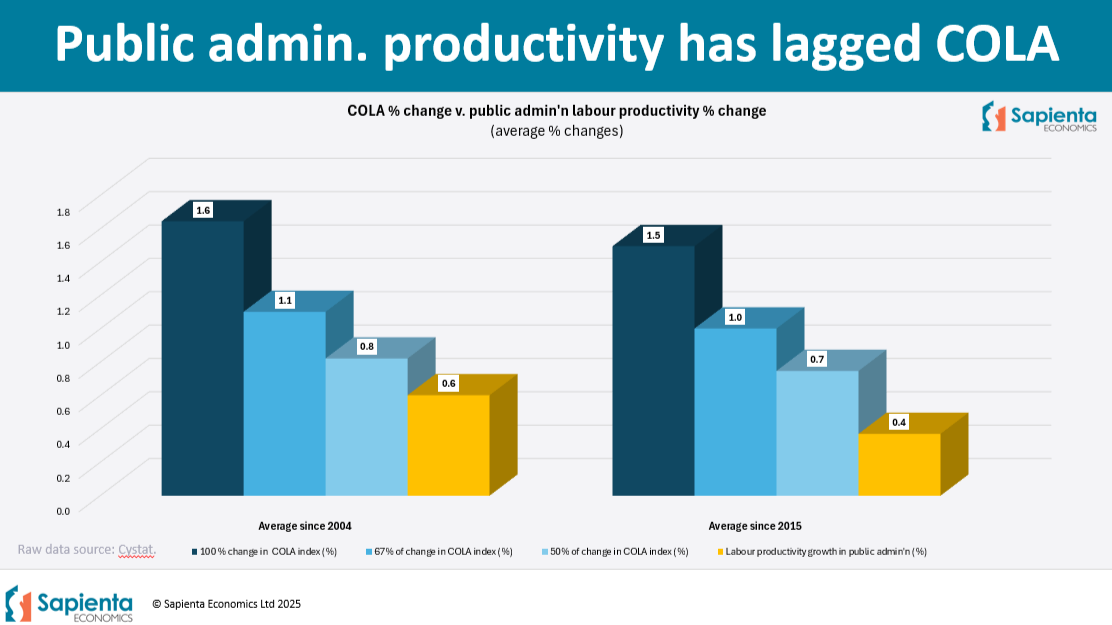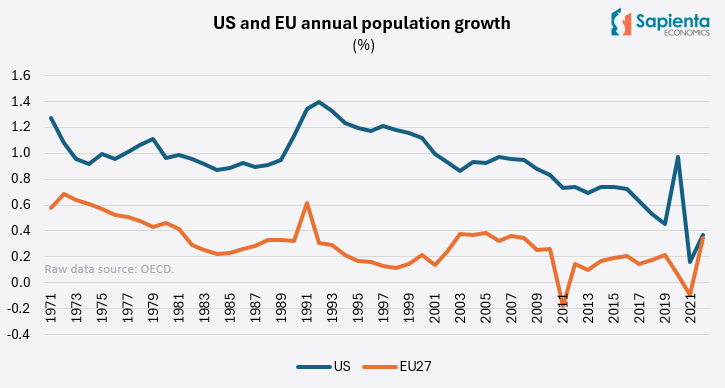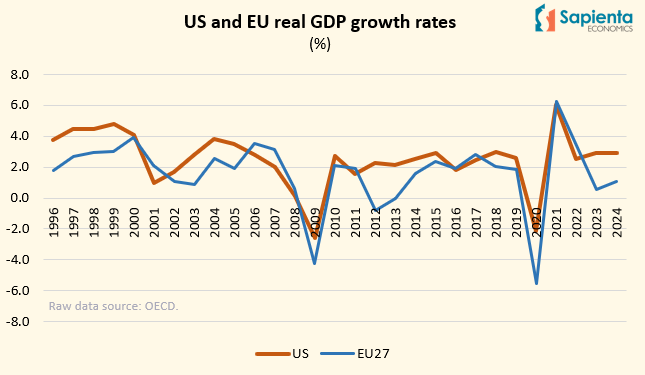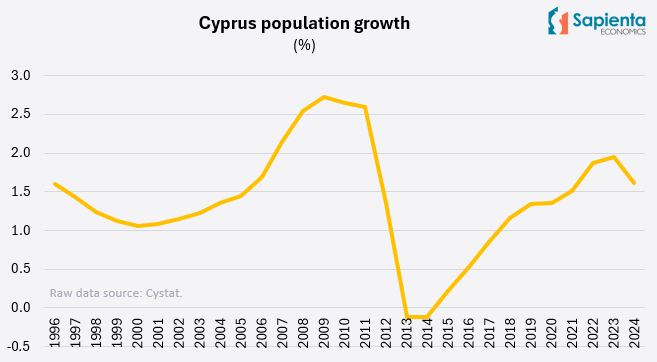Cyprus productivity-wages link is essential for jobs
The only way to compete with ai is to get more productive
In this “back to school” week I am conducting an experiment. This article first appeared on LinkedIn earlier this week, where I have recently shelled out for the paid version and am wondering whether it makes any difference. I want to compare how many read it on LinkedIn with how many read it on here. Apologies if you have read it already. I plan to post something unique next week.
Trade unions in Cyprus have called for a general strike next week. They want the wage indexation, known as the Cost of Loving Adjustment (COLA), or ATA in Greek, to be returned to being 100% linked to consumer price inflation (minus excise duties), as it was prior to 2012 and the 2013 financial crisis. Today, COLA is fixed at 66.67%. As I noted in this video here, and as you can see from the chart above, wages have risen faster the productivity growth in Cyprus, even if you fix COLA at 50%. For reasons explained below, this is a problem for the future economic prosperity of all workers. Someone urgently needs to make the case that, if the government gives in and does not make sure that COLA is linked to productivity, people will lose jobs.
Why? Two reasons: shrinking populations and the coming disruptions caused by artificial intelligence (ai).
Shrinking populations. It is fairly easy to achieve economic growth, and therefore jobs growth, wages growth, and therefore happy voters, when a population is growing. A growing population means a rising number of mouths to feed, people to house, educate, provide healthcare for and so on. It creates the demand that drives economic growth (known as real GDP growth). When you don’t have population growth, you can only really get real GDP growth through productivity improvements. I shall get that onto that in a moment.
Population growth and real GDP growth are therefore closely linked, especially in developed economies. Think about the US and the EU. The population of the US has grown faster than the EU for decades. It is therefore no surprise that the US real GDP growth rate has also been higher than the EU for decades (see charts). It hasn’t grown much faster. But just a little bit each year accumulates to make a big difference.
(Why are these charts different sizes and why does Substack not allow me to fix that? Who knows.)
A big reason why Cyprus has enjoyed stronger growth than the EU average is because its population has grown more quickly. And most of that population growth has been down to newcomers. Non-Cypriots now account for a massive 40% of employment according the Social Insurance Department: 23% are non-EU, 17% are EU, 59.5% are Greek Cypriots and 0.5% are Turkish Cypriots.
But judging from some of the conversations on LinkedIn in recent weeks, it is clear that there are increasing concerns about even wealthy foreigners: foreign buyers of property and well paid foreign workers. And we know from the far too frequent beatings of delivery drivers, combined with changes in political party affiliations, that there is increasing intolerance towards lower paid foreign labour too.
Politically, this means that successive Cypriot governments will end up being forced into restricting immigration. But even if this doesn’t happen, even if there is no tightening of restrictions on foreigners, the population growth of Cyprus is already slowing (see chart). This, in turn, will lead to slower economic growth and therefore fewer jobs and higher unemployment, unless we can increase productivity.
Disruptions caused by artificial intelligence (ai). Productivity increases mean that you produce more with the same amount of work. While we know that ai is said to bring rubbish results (“hallucinate”) as much as 48% of the time, that is not going to stop it sweeping away a whole load of jobs. The only way to compete with ai is to get more productive at the things humans still do better.
And the best way for Cyprus to encourage that is to ensure that wage increases are linked to increases in productivity, not simply inflation. Linking wages to productivity would have political advantages too. It will decrease the focus of business on getting by with non-Cypriot cheap labour. It will increase the focus instead on improving productivity, which in turn will spark investments in human resources, machinery and equipment, technology and so on.
And all of these investments will ultimately be good for long-term prosperity of the very workers that the trade unions seek to protect.
If you want my premium monthly in-depth product, check out Sapienta Country Analysis Cyprus and other deep-dive reports here or single copies here. And if you can’t afford those but want the executive summary only for just €100/year*, you can find that here on Substack, at Cyprus Pocket Brief.
Or support this publication, Sapienta Cyprus Snippets, for just €49 per year.*
*Monthly payments are a massive administrative headache, so since I can’t switch them off I have effectively banned them by setting the monthly price the same as the annual.






